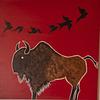You need to sign in or sign up before continuing.
Take a photo of a barcode or cover
I have mixed feelings about this one. I loved many of the characters – especially Betsy Trotwood, the Micawbers, and Agnes. (And now I understand why Uriah Heep is such an iconic villain; he's so much fun to hate.) Dickens writes with such humor, whimsy, and idiosyncratic attention to detail that it's easy to enjoy the writing on a microlevel. But the way the story was structured and paced failed to draw me in completely. I was involved in short bursts, slogging through duller chapters and then having my interest sparked by the next. But it was never quite enough. I suspect this has to do with the way David Copperfield was originally serialized. Also, as much as I liked David as a kid, he was frustratingly naive as an adult – it's like he never really grew up. Which I'm sure is part of the point, but all the same, I didn't love him like I wanted to.
This book is about ... surprise, David Copperfield. But because it was written in the 19th century, and it was written by Charles Dickens, it’s absolutely all about David, starting hours before he is born. Characters who in any other story would be incidental are brought back hundreds, HUNDREDS of pages later and it’s fantastic.
What I love so much about this story is how thoroughly the reader understands David. He’s a boy and then a young man, struggling to understand the world and find his way in it. This means that he makes mistakes and the reader is reminded of the follies of youth instead of questioning the author.
Ok, but the ladies! I was pretty distraught over Esther Summerson in Bleak House, and had similar feelings here. I really don’t understand if the creepy, incestuous way that some of these relationships are described: father/husband, sister/lover ... the actual stepfather/stepdaughter relationship ... is a comment on the times and women’s lack of agency or if it’s some weirdo hang up of Dickens. What gives, Charles Dickens? And speaking of those ladies, Betsey Trotwood joins the pantheon of best female characters I have ever read.
What I love so much about this story is how thoroughly the reader understands David. He’s a boy and then a young man, struggling to understand the world and find his way in it. This means that he makes mistakes and the reader is reminded of the follies of youth instead of questioning the author.
Ok, but the ladies! I was pretty distraught over Esther Summerson in Bleak House, and had similar feelings here. I really don’t understand if the creepy, incestuous way that some of these relationships are described: father/husband, sister/lover ... the actual stepfather/stepdaughter relationship ... is a comment on the times and women’s lack of agency or if it’s some weirdo hang up of Dickens. What gives, Charles Dickens? And speaking of those ladies, Betsey Trotwood joins the pantheon of best female characters I have ever read.
While I liked the story and writing, this one earns five stars for the characters alone, who are all so vividly and memorably (and often, amusingly) described. It was interesting to read this after having read Demon Copperhead. In Demon, it was all about Demon and the voice Kingsolver wrote for that character for me. I've said before, I'm not sure I've ever rooted so hard for a fictional character to succeed.
In David Copperfield, however, the real draw for me were the secondary characters, whether I was hoping for them to make good or anticipating their downfall, especially after David gets past the worst of his childhood/adolescent hardships. There were some characters I delighted in: Aunt Betsey Trotwood, who grew into one of my favorites by the end; the Micawbers--yes, Mr. Micawber and all his correspondence, but also poor Mrs. Micawber, if only I had someone believe in me half as much as she did in her husband; Traddles, the Peggotys, etc. And then there were the deliciously awful characters: the slimy, odious Uriah Heep, the dreary Murdstones, the annoying Dora.
This definitely makes me want to pick up more Dickens. I'm looking forward to discussing David/Demon with a friend who has been very patiently waiting months for me to finish.
In David Copperfield, however, the real draw for me were the secondary characters, whether I was hoping for them to make good or anticipating their downfall, especially after David gets past the worst of his childhood/adolescent hardships. There were some characters I delighted in: Aunt Betsey Trotwood, who grew into one of my favorites by the end; the Micawbers--yes, Mr. Micawber and all his correspondence, but also poor Mrs. Micawber, if only I had someone believe in me half as much as she did in her husband; Traddles, the Peggotys, etc. And then there were the deliciously awful characters: the slimy, odious Uriah Heep, the dreary Murdstones, the annoying Dora.
This definitely makes me want to pick up more Dickens. I'm looking forward to discussing David/Demon with a friend who has been very patiently waiting months for me to finish.
funny
hopeful
reflective
sad
slow-paced
Plot or Character Driven:
A mix
Strong character development:
Complicated
Loveable characters:
Complicated
Diverse cast of characters:
N/A
Flaws of characters a main focus:
Yes
“…𝘵𝘩𝘪𝘴…𝘳𝘦𝘮𝘪𝘯𝘥𝘴 𝘮𝘦 𝘰𝘧 𝘢 𝘱𝘦𝘳𝘪𝘰𝘥 𝘰𝘧 𝘭𝘪𝘧𝘦 𝘸𝘩𝘦𝘯 𝘐 𝘸𝘢𝘴 𝘪𝘯 𝘢 𝘴𝘵𝘢𝘵𝘦 𝘰𝘧 𝘤𝘦𝘭𝘪𝘣𝘢𝘤𝘺, 𝘢𝘯𝘥 𝘔𝘳𝘴 𝘔𝘪𝘤𝘢𝘸𝘣𝘦𝘳 𝘩𝘢𝘥 𝘯𝘰𝘵 𝘺𝘦𝘵 𝘣𝘦𝘦𝘯 𝘴𝘰𝘭𝘪𝘤𝘪𝘵𝘦𝘥 𝘵𝘰 𝘱𝘭𝘪𝘨𝘩𝘵 𝘩𝘦𝘳 𝘧𝘢𝘪𝘵𝘩 𝘢𝘵 𝘵𝘩𝘦 𝘩𝘺𝘮𝘦𝘯𝘪𝘢𝘭 𝘢𝘭𝘵𝘦𝘳.”
In case you don’t know, the gist of David Copperfield is; orphaned boy goes through various stages of impoverishment and success on his coming of age journey to a life as popular novelist. The cast of characters that rotate in and out of his life are the main ‘plot’. It’s believed to be partly autobiographical.
I decided it was time to read this as I adored Demon Copperhead earlier this year, and felt the context of its inspiration was probably needed to fully appreciate. Indeed I do admire it even more now. After my miserable time trudging through Emma recently, I am glad to say reacquainting myself with Dickens was a lot more enjoyable than with Austen.
Dickens was surprisingly modern in his writing, in terms of humour, satire and social values. His characters, whilst often a bit one dimensional individually, are varied and vivid as a collective. It’s both interesting intellectually as a ‘classic’ and enjoyable in and of it’s self. But, and it’s a big but - it is overly long, excessively drawn out. Be prepared to want to throw the towel in at some points, as it’s like trying to take a brisk walk with a toddler. As such I am glad I listened to this on audio (but look at this cute cloth bound I have!) as I have more patience for this sort of thing when I am also ticking off chores at the same time 😅 I also did get throughly sick of Dora and David’s relationship, possibly the most grating couple in existence!
adventurous
hopeful
reflective
medium-paced
I usually say that I love Dickens. I think now I need to correct that and say I love some Dickens. I wanted this book to be over long before it was. However, I could read Great Expectations any day.
adventurous
challenging
emotional
funny
sad
slow-paced
Plot or Character Driven:
Character
Strong character development:
Yes
Loveable characters:
Complicated
Diverse cast of characters:
Yes
Flaws of characters a main focus:
Yes
1 star ⭐️
This is not my first Dickens, but it is the first that felt like I was wading through mud to finish it.
This is not my first Dickens, but it is the first that felt like I was wading through mud to finish it.
Dickens' shouldn't be a forced read, but taken at a leisurely pace. If you don't go in with great expectations in mind, and read like it with a touch of realism in mind, it's well worth the time.
dark
emotional
funny
sad
slow-paced


